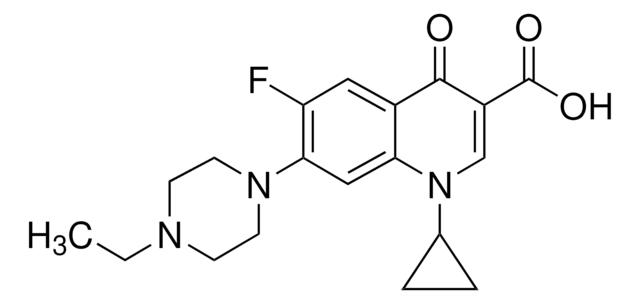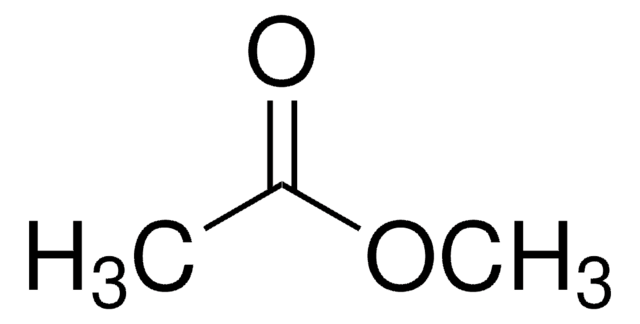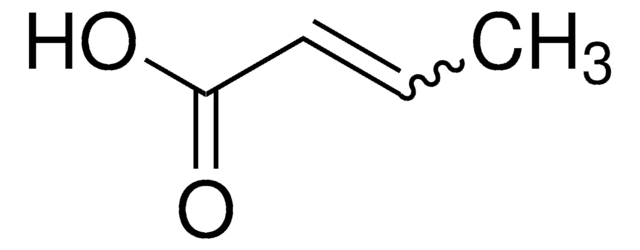1572208
USP
Acide propionique
United States Pharmacopeia (USP) Reference Standard
Synonyme(s) :
Acide en C3, Acide propanoïque, Acide propanyl
About This Item
Produits recommandés
Qualité
pharmaceutical primary standard
Densité de vapeur
2.55 (vs air)
Pression de vapeur
2.4 mmHg ( 20 °C)
Famille d'API
propionic acid
Température d'inflammation spontanée
955 °F
Limite d'explosivité
12.1 %
Fabricant/nom de marque
USP
Indice de réfraction
n20/D 1.386 (lit.)
Point d'ébullition
141 °C (lit.)
Pf
−24-−23 °C (lit.)
Densité
0.993 g/mL at 25 °C (lit.)
Application(s)
pharmaceutical (small molecule)
Format
neat
Chaîne SMILES
CCC(O)=O
InChI
1S/C3H6O2/c1-2-3(4)5/h2H2,1H3,(H,4,5)
Clé InChI
XBDQKXXYIPTUBI-UHFFFAOYSA-N
Vous recherchez des produits similaires ? Visite Guide de comparaison des produits
Description générale
For further information and support please go to the website of the issuing Pharmacopoeia.
Application
Remarque sur l'analyse
Autres remarques
Mention d'avertissement
Danger
Mentions de danger
Conseils de prudence
Classification des risques
Eye Dam. 1 - Flam. Liq. 3 - Skin Corr. 1B - STOT SE 3
Organes cibles
Respiratory system
Code de la classe de stockage
3 - Flammable liquids
Classe de danger pour l'eau (WGK)
WGK 1
Point d'éclair (°F)
129.2 °F - closed cup
Point d'éclair (°C)
54 °C - closed cup
Certificats d'analyse (COA)
Recherchez un Certificats d'analyse (COA) en saisissant le numéro de lot du produit. Les numéros de lot figurent sur l'étiquette du produit après les mots "Lot" ou "Batch".
Déjà en possession de ce produit ?
Retrouvez la documentation relative aux produits que vous avez récemment achetés dans la Bibliothèque de documents.
Les clients ont également consulté
Articles
Separation of Propionic acid; Acetic acid; Heptanoic acid; Isobutyric acid; Valeric acid; Isocaproic acid; Butyric acid; Isovaleric acid
Protocoles
In this study, SPME was used for the analysis of free fatty acids in Parmesan cheese using a 65 μm Carbowax/divinylbenzene (DVB) SPME fiber. Headspace extraction of the cheese sample was conducted at 65 °C for 15 minutes and analyzed by GC with FID detection. SPME is ideal for analyzing the volatiles associated with solid food samples. The phase chemistry of the Nukol GC column provides excellent peak shape of acidic compounds.
Separation of Acetone; Acetic acid; Propionic acid; Ethyl butyrate; Ethanol; Isoamyl acetate; Isobutyric acid; 3-Methyl-2-butanol; Methyl acetate; 1-Propanol; Acetal, ≥98%, FG; 2-Methyl-1-pentanol; Butyl acetate; Ethyl propionate; 3-Pentanol; 2-Pentanol, 98%; Ethyl isobutyrate; Isobutyl acetate; Acetaldehyde; Furfural; Butyric acid; Methanol; Ethyl acetate
Notre équipe de scientifiques dispose d'une expérience dans tous les secteurs de la recherche, notamment en sciences de la vie, science des matériaux, synthèse chimique, chromatographie, analyse et dans de nombreux autres domaines..
Contacter notre Service technique













